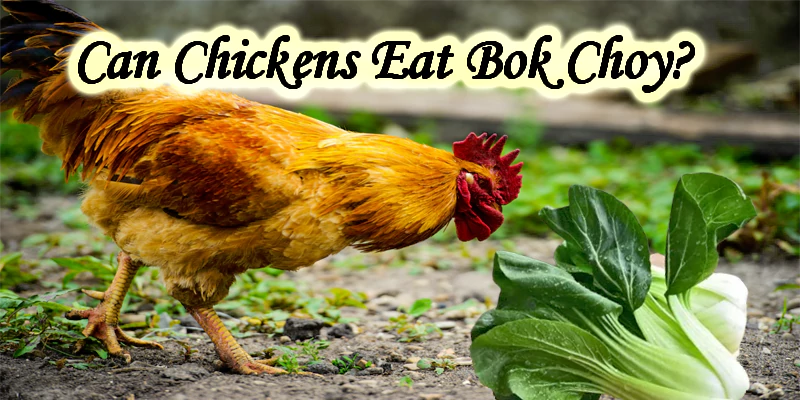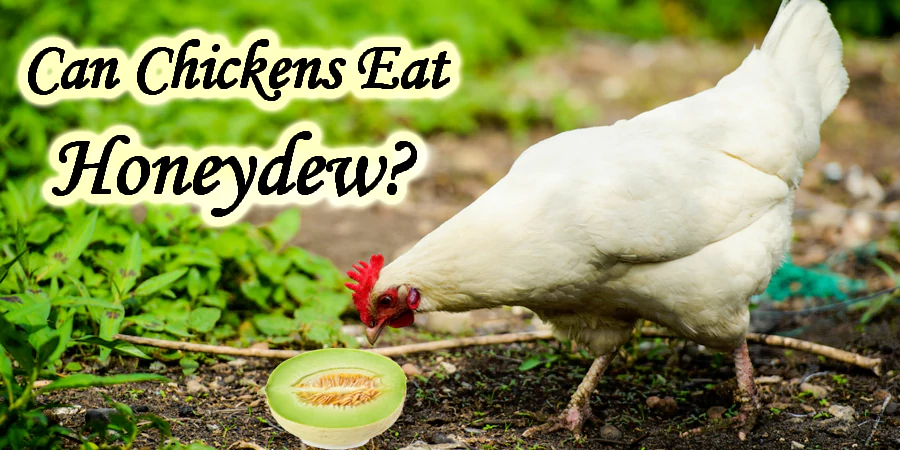Can Chickens Eat Bok Choy: A Decisive Guide
Published: 6 Jan 2024
As a general statement chickens can enjoy the delightful treat of Bok Choy but with some consideration. Before making a concluding statement about “Can chickens eat Bok Choy or not”, it is imperative to deep dive into the matter by factual analysis. We will consider each important factor related to Bok Choy and chickens in this article and develop a realistic correlation.

Can Chickens Have Bok Choy? A Comprehensive Analysis
What is Bok Choy?
Bok Choy belongs to the cabbage family which includes vegetables with green leaves. It is famous for its crunchy texture, highly nutrient-rich, tasty flavor, and good digestion properties. Bok Choy can be used in raw or cooked form. It is a very healthy food for humans, birds, and animals. It is also used as a salad. The rich vitamin’s value adds a health factor.
Nutritional Value of Bok Choy
Bok Choy is considered a powerhouse for poultry. It provides multivitamins that are helpful for chicken growth. It is full of vitamins A, C, and K. Bok Choy contains a high volume of Potassium. Each of these nutrients has specific advantages for chicken growth:
- Vitamin A: Improves the immune system of chickens.
- Vitamin C: Provides feather growth and works as an inflammatory tonic.
- Vitamin K: It helps in bone growth and proper coagulation in chickens.
- Potassium: It helps in heart functioning and solves electrolytic issues in chickens.
Bok Choy has a nutritionally rich profile which ensures the health and growth of the chickens. A good immune system saves the flock from various contagious diseases. So, to provide a well-rounded feed to chickens, Bok Choy is very helpful.
Nutrientional Values Per 100 Grams of Bok Choy
| NUTRIENT | VALUE/100 GRAMS | NUTRIENT | VALUE/100 GRAMS |
|---|---|---|---|
| Energy | 13 Kcal | Water | 95.3 g |
| Protein | 1.5 g | Fat | 0.2 g |
| Carbohydrate | 2.2 g | Fiber | 1.0 g |
| Sugars | 1.2 g | Calcium | 105 mg |
| Iron | 0.8 mg | Magnesium | 19 mg |
| Phosphorus | 37 mg | Potassium | 252 mg |
| Sodium | 65 mg | Zinc | 0.2 mg |
| Vitamin C | 45 mg | Thiamin (Vitamin B1) | 0.04 mg |
| Riboflavin (Vitamin B2) | 0.07 mg | Niacin (Vitamin B3) | 0.4 mg |
| Vitamin B6 | 0.2 mg | Folate | 66 µg |
| Vitamin A | 2681 IU | Vitamin K | 45.5 µg |
Raw Bok Choy VS Cooked Bok Choy
The chickens are found happy with both options. Both Raw and cooked Bok Choy have specific positive factors. It is also suggested to use a mix of both forms Bok Choy for better results and catering the individual preferences. The careful observation of their response for each form will help to plan for future culinary processes.
Is raw bok choy toxic for chickens. The answer is NO. Raw Bok Choy provides the benefits of crispy texture, easy handling, less effort, and less cost. However, Cooked Bok Choy is better for digestion, tender and palatable food, and provision of good flavor.
Are Bok Choy Leaves are Edible for Chickens?
Yes, chickens can consume Bok Choy leaves easily. It contains healthy vitamins and minerals. It possesses Vitamin A, C, and K. Additionally, it provide a decent value of calcium content. These nutrients are healthy and supports the overall growth of our beloved clucking friends.
It is crucial to properly clean these leaves and remove all pesticide residues. It is also favorable to cut bok choy leaves into small pieces. It will prevent choking issues. It is strictly warned to serve Bok Choy leaves in moderation. Never use it as a regular diet for chickens. It will cause nutritional deficiency in our flock. So, be attentive and observe the reaction from chickens and adjust accordingly.
Is Bok Choy Suitable for Baby Chicks?

Baby Chickens are very sensitive and more prone to digestive issues and viral infection. Therefore, their feed must be calculated and moderate.
It is advisable to chop the Bok Choy into small pieces before serving to Chicks to avoid choking issues. The Bok Choy must be washed and de-contaminated to save Chicks from toxin effects.
It is also essential to cautiously monitor any signs of an allergic reaction after serving the feed. The quantity of Bok Choy should be kept moderate according to the dietary needs of the Chicks. If a digestive issue is noticed, then immediately consult with a professional veterinarian.
By taking these precautionary measures, Chicks can eat Bok Choy. It is very helpful to develop a better immune system and ensure the healthy growth of the Chicks.
Recommended volume of Bok Choy for Chickens
The feasible dietary needs of the chickens depend on their age, size, and location. Keeping in view these factors, feeding in moderation is a common guideline. A handful of chopped Bok Choy is enough for small to medium-sized Chickens. The standard feed pattern suggests that Bok Choy should not exceed ten percent of the total diet.
A balanced nutritious value of diet is the important primary source for the growth of Chickens. You must use the Bok Choy as a secondary source of nutrients besides the regular feed. The decline in egg production and growth indicates the need for adjusting the feed. So, your observation plays a vital role in providing the complete feed to Chicken.
How to Serve Bok Choy to Chickens?
It is established that feeding Bok Choy is a complete organic diet for poultry. It is also important to present it in enjoyable ways that make the chickens happy. Again, you can decide on a certain pattern by observing their response to various feeding techniques. As per previous experience, the following methods/ideas are effective enough to consider while feeding your love birds.
- The chicks are like fresh and chopped pieces of Bok Choy.
- Mix the Bok Choy with regular food.
- Soft texture Bok Choy by cooking and blending
- The chickens also like to eat Bok Choy hanging in the cage
- The chopped and frozen pieces of Bok Choy in warm weather
- String Bok Choy pieces on a skewer
- Scatter the Bok Choy that stimulates rummaging
Preparation Method of Bok Choy for Chickens
Some factors should be considered while preparing the delicious food of Bok Choy. These steps will help you to serve Bok Choy in an engaging and contamination-free status. The application of these methods helps the Chickens to have a healthy diet enjoyably.
- Thoroughly wash the base and undersides of Bok Choy to eliminate the hidden contaminated particles (dirt and pesticides).
- To serve only healthy and fresh feed, remove the outer wilted leaves of Bok Choy. It will ensure the high quality of feed for Chickens.
- Chopping of Bok Choy helps the Chicken to swallow without the risk of choking. It also reduces digestive problems.
- Cooked Bok Choy is a more palatable and tender food for Chickens. You should serve the cooked feed after cooling to comfort ability of Chickens.
- It is recommended to serve Bok Choy after properly mixing with routine feed.
- To develop a natural foraging behavior, serve the Bok Choy in scattered and hanging in their coop. It is an engaging manner.
Bok Choy Can Be Mixed With These Foods
Many food articles can be used with Bok Choy. We have selected some foods with their benefits to make you clear in selecting the best combination. These variations will add a pleasing texture and flavor to the diet. While mixing the feed, you must ensure the moderation.
- Leafy green vegetables: Leafy green vegetables are rich in vitamins A and K which improve the immune system. Kale, Lettuce, and spinach are worth selecting.
- Berries: To improve the feather strength, blueberries, raspberries, cranberries, and strawberries are the best food to mix with Bok Choy. Berries are full of antioxidants.
- Grains: Bok Choy can be used with various types of grains especially Brown rice and Quinoa.
- SEEDS: To feed the proteins Bok Choy should be used with sunflower and Chia seeds. These seeds are full of fatty acids and help in feather growth and strength. Understand the nutritional breakdown of chia seeds and then offer to your feathered companions.
- FRUITS: The addition of fruits like apples and watermelon ensures the provision of essential vitamin intake. This mixed feed will help the chicken in digestion and dehydration issues.
- YOGURT: Plain and unsweetened Yogurt will add a touch of pro-biotics which improves the gut health of Chickens.
- CHEESE: Protein and calcium are vital ingredients for Chicken to form eggshells and bone health.
- VEGETABLES: Mixing Bok Choy with vegetables like Broccoli, Fennel, and Carrots adds a texture with vitamins & minerals useful for health.
- HERBS: As we know herbs possess antioxidants and a mixture of herbs (Cilantro and Parsley) and Bok Choy will add a flavor to enhance the taste of the feathered meal.
Benefits of Bok Choy for Chickens
We have already established that Bok Choy has a rich nutritional profile. Now, we will explore the benefits of feeding Bok Choy to Chickens. Let’s unravel the impacts of feeding Bok Choy to Chickens:
|
Potential Risks of Feeding Bok Choy to Chickens
After a healthy discussion about the benefits associated with Bok Choy, we must consider its drawbacks or side effects. We have selected some most common risks that were experienced while feeding Bok Choy to chickens. Here are the risks…
|
Impacts of Bok Choy on Quality of Meat and Eggs
A well-balanced Bok Choy diet affects the quality of meat and eggs of chickens. Here are some insights about how Bok Choy plays a pivotal part in enhancing the quality of eggs and meat.
- Effects on Meat: Vitamin A and calcium content improve the meat quality of chickens. The mild flavor of Bok Choy adds subtle changes in the taste of meat.
- Effects on Eggs: The nutrient value of Bok Choy can impact the quality of eggs, especially Vitamins A and K. The change in yolk color is also observed after successive feeding of Bok Choy. It contains omega-3 fatty acids that promote the fatty acid content in eggs.
Potential Allergic Reactions of Feeding Bok Choy
Bok Choy can create some sort of allergic issue in chickens if used in excessive volume or frequency. The identification in the initial phase helps counter the allergic reactions. So, how to know if bok choy is bad for your chickens? For that purpose you must carefully observe the following behaviors/ reactions from chickens.
- Digestive Upset: A change in the droppings pattern can be an indicator of digestive issues. Diarrhea may be a prominent sign of an allergic reaction.
- Weakness or Exhaustion: Allergic chicken may show lethargic behavior. Low activity is a vital sign of an allergic reaction.
- Decreasing Appetite: Chickens with allergies may show disinterest in feeding their regular diet.
- Behavioral changes: The sudden behavioral changes like an increase in aggression or loathness from the flock may indicate an allergic problem.
- Difficult breathing: Labored and wheezing breathing is a severe allergic condition. Monitor the respiratory distress in the flock.
- Runny eyes or nose: Allergies may be identified with secretion from the eyes and nose. Cautiously monitor the nasal or ocular discharge of chickens.
- Ruffling Feathers: Allergic reactions may affect the feather’s health. Ruffling or preening of feathers indicates the adverse effects of allergies.
- Swelling: Prominent signs of swelling around the face, wattles, and comb that causes itching issues in chickens.
- Vomiting: vomiting may also be a sign of allergic chicken. It is the result of digestive upset. The chickens will be seen stretching their necks repetitively.
Alternative Foods to Bok Choy
If Bok Choy is not available and you want to get some food with similar nutrient value then these are the best alternatives.
- Kale: As Bok Choy, Kale is full of Vitamins and minerals. Vitamins A, C, and K enhance the immune system and provide essential support for feather growth. It contains calcium which strengthens the bones.
- Spinach: Like Bok Choy, it is also a leafy green vegetable with a bundle of vitamins and enriched with iron content. The antioxidant content of Spinach improves the overall health of chickens.
- Swiss chard: Once again we have presented a leafy green vegetable as a Bok Choy alternative. It is full of Vitamins A and K. Vitamin A enhances eyesight and Vitamin is helpful for blood clotting.
- Collard green: It is also a close leafy vegetable that contains a high volume of vitamins and minerals. It can be used in cooked form. It is very important for the overall well-being of your flock. Understand the benefits of collard greens and serve to your flock.
- Cabbage: This vegetable is available in green, white, and red colors. Like Bok Choy, it is full of vitamins and minerals. Vitamin C promotes the immune functions. Sodium and calcium help in the optimal growth of chickens.
- Broccoli: It also belongs to the cabbage family and contains multi-nutrients. Vitamin C and iron content promote the overall growth of chickens. Sodium, Magnesium, and potassium ensure the optimal development.
Conclusion:
First thing first, chickens can eat Bok Choy. It must be served as the secondary or supplementary diet to chickens. There is no doubt that Bok Choy is packed with various vitamins and minerals helpful in chicken growth. Past observation and experience verify that it is highly useful to improve chicken’s immune function, enhance bone strength, support the development process, and promote the digestive process.
Despite these benefits, careful observation and adjustment are very important factors. Always serve the fresh and decontaminated Bok Choy with a regular diet. If you have any query related to this article, please feel free to ask in the comment section.

- Be Respectful
- Stay Relevant
- Stay Positive
- True Feedback
- Encourage Discussion
- Avoid Spamming
- No Fake News
- Don't Copy-Paste
- No Personal Attacks

- Be Respectful
- Stay Relevant
- Stay Positive
- True Feedback
- Encourage Discussion
- Avoid Spamming
- No Fake News
- Don't Copy-Paste
- No Personal Attacks


